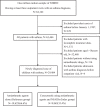Risk of asthma exacerbation associated with nonsteroidal anti-inflammatory drugs in childhood asthma: A nationwide population-based cohort study in Taiwan
- PMID: 27741128
- PMCID: PMC5072955
- DOI: 10.1097/MD.0000000000005109
Risk of asthma exacerbation associated with nonsteroidal anti-inflammatory drugs in childhood asthma: A nationwide population-based cohort study in Taiwan
Abstract
Patients allergic to aspirin or nonsteroidal anti-inflammatory drugs (NSAIDs) who develop respiratory reactions such as bronchospasm or asthma exacerbation have aspirin-induced asthma or NSAIDs-exacerbated respiratory disease. However, large-scale studies have not been conducted to investigate the risk of aspirin/NSAIDs exposure in children with asthma. Therefore, this study evaluated the relationship between aspirin/NSAIDs and the risk of asthma exacerbation in children with asthma.This retrospective cohort study was conducted using the data of 1 million random beneficiaries of the Taiwan National Health Insurance program between 1997 and 2012. Children aged ≦18 years diagnosed with asthma by physicians were enrolled. The study population was divided into the index group (concurrently using antiasthmatic agents and NSAIDs patients) and reference group (using antiasthmatic drugs alone), and the relative risks (RRs) of hospitalizations resulting from asthma exacerbation in both groups were estimated.The rate of asthma exacerbation was higher in the index group than the reference group, resulting in asthma-related hospitalizations (RR: 1.49, 95% confidence interval [CI]: 1.37-1.61; adjusted RR: 1.41, 95% CI: 1.30-1.53). Short-term aspirin, ibuprofen, and diclofenac use probably correlated with asthma exacerbation in children with asthma. No association between long-term aspirin, ibuprofen, and diclofenac consumption and the risk of asthma exacerbation was identified in this study.
Conflict of interest statement
The authors have no conflicts of interest to disclose.
Figures
References
-
- Szczeklik A, Stevenson DD. Aspirin-induced asthma: advances in pathogenesis, diagnosis, and management. J Allergy Clin Immunol 2003; 111:913–921. - PubMed
-
- Morales D, Guthrie B, Lipworth B, et al. NSAID-exacerbated respiratory disease: a meta-analysis evaluating prevalence, mean provocative dose of aspirin and increased asthma morbidity. Allergy 2015; 70:828–835. - PubMed
-
- Settipane RA, Constattine HP, Settipane GA. Aspirin intolerance and recurrent urticaria in normal adults and children. Allergy 1980; 35:149–154. - PubMed
-
- Wang HM, Lin SK, Yeh CH, et al. Prescription pattern of Chinese herbal products for adult-onset asthma in Taiwan: a population-based study. Ann Allergy Asthma Immunol 2014; 112:465–470. - PubMed
Publication types
MeSH terms
Substances
LinkOut - more resources
Full Text Sources
Other Literature Sources
Medical


